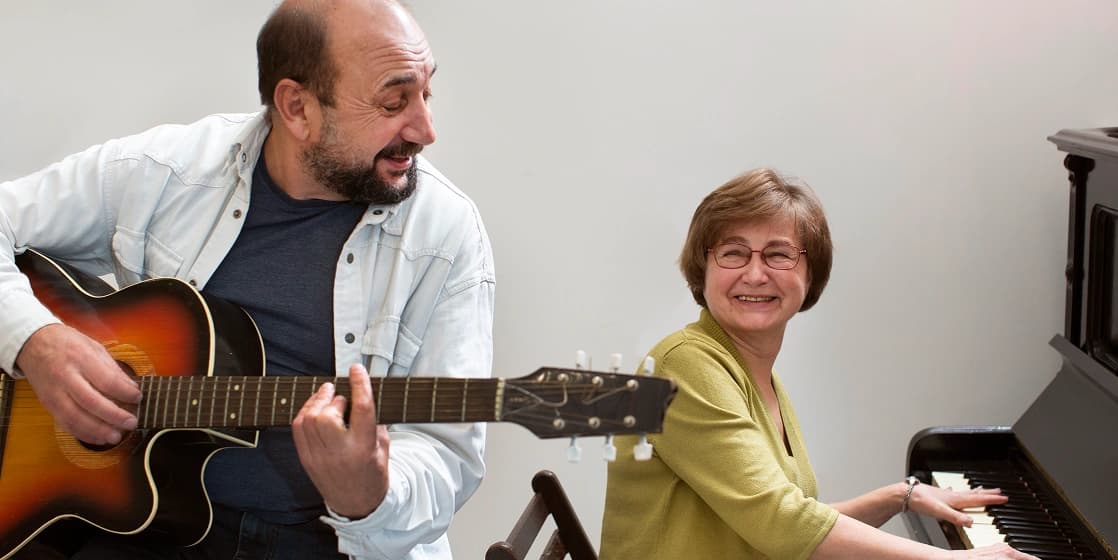Is It Too Late to Start an Instrument? A Practical Guide for Adult Beginners



Is It Too Late to Start an Instrument? A Practical Guide for Adult Beginners
If you’re wondering “Is it too late to start an instrument?”—the answer is no. Adults learn differently, not worse. With clear goals, the right teacher, and a realistic routine, you can make steady progress and enjoy the benefits of music—stress relief, sharper focus, and a creative outlet—at any age.
Below you’ll find how to choose an instrument, a simple 30-day starter plan, a 20-minute practice routine, and ways in-home private lessons remove friction so you actually stick with it.
Why Adults Make Great Music Students
- Stronger motivation: You’re choosing to learn—intrinsic motivation beats “because I have to.”
- Better study habits: Adults follow checklists, track goals, and practice with intention.
- Life experience = musicality: You already understand phrasing, emotion, and storytelling—music brings it to life.
- Flexible goals: Play for relaxation, perform for family, write songs—your path is yours.
Which Instrument Should You Start With?
Choose based on your goals, budget, and space:
- Piano/Keyboard (most forgiving): Clear note layout; fast early wins. A full-size 88-key weighted keyboard is great if you don’t own a piano.
- Guitar/Ukulele: Chords come quickly; perfect for singing and accompanying yourself.
- Voice: Your built-in instrument—learn breathing, pitch, and healthy technique.
- Violin/Cello: Beautiful tone and expressive range; expect a steeper early curve.
- Drums/Percussion: Fantastic for rhythm, coordination, and stress relief.
Tip: Book a trial lesson to test two instruments before committing.
A 30-Day Starter Plan (Adults)
Week 1: Setup & Sound
- Teacher fit, posture, hand/arm position, how to make your first clear tone.
- Learn a 5-minute warm-up (breathing for voice; finger drills for piano/guitar).
Week 2: First Repertoire
- One short piece/song that uses 2–4 basic patterns or chords.
- Learn how to count time and practice slowly with a metronome.
Week 3: Build Skills
- Add a second piece or expand your first (new section, higher tempo).
- Introduce ear training: match 3–5 simple intervals or chord shapes by ear.
Week 4: Share What You Can Play
- Record a 30–60 sec video for a friend/family member.
- Note one thing you like and one thing to improve—then set your next 30-day goal.
The 20-Minute Practice Routine (That Actually Fits Your Day)
- Warm-Up (3–5 min): Breathing + slow scales/chords to wake up muscles and ears.
- Core Skill (7–10 min): One focused drill (left-hand independence, chord changes, bow control).
- Music Time (5–7 min): Play your piece slowly once, then at target tempo once.
- Wrap-Up (1–2 min): Jot a note: What improved? What’s tomorrow’s micro-goal?
Busy day? Do two 10-minute sessions—morning and evening. Consistency beats marathon practice.
Common Adult Roadblocks (and How to Beat Them)
- “I don’t have time.” In-home lessons eliminate commute time. Pair practice with a habit you already do (after coffee, before TV).
- “I sound bad.” Everyone does at first. Use slow practice and celebrate small wins (a clean phrase, smoother chord change).
- “My fingers/hands get tired.” Micro-breaks every 5–7 minutes; keep shoulders loose; use proper posture your teacher shows you.
- “I’m embarrassed.” Start with private, supportive lessons. Share recordings with one trusted person when you’re ready.
What You’ll Learn in Your First 3 Lessons
- Technique foundations: Posture, hand shape, breathing/bow/chord basics.
- Rhythm & counting: How to feel steady time (with or without a metronome).
- A real song: A short, recognizable piece so you hear progress quickly.
- Home plan: A simple practice checklist tailored to your schedule.
FAQs for Adult Beginners
Do I need to read music?
Not to start. Many adults begin with chord charts, tabs, or lyric sheets and add notation later.
Am I too old for piano/violin/voice?
No. We tailor technique and pacing so your body and schedule are respected.
How soon will I play something recognizable?
Often within the first 2–4 weeks—if you keep the 20-minute routine.
Can lessons be flexible with my work travel?
Yes—in-home lessons plus occasional virtual make-ups keep your streak going.
Simple Gear Checklist (Start Smart, Not Expensive)
- Piano: 88-key weighted keyboard + stand + bench + sustain pedal.
- Guitar/Ukulele: Proper setup, tuner, comfortable strap; light gauge strings if you’re new.
- Voice: Water bottle, quiet space, music stand; optional keyboard for pitch.
- All: Metronome app, device to record practice (your phone is perfect).
Starting as an adult is not a disadvantage—it’s a superpower. You bring focus, taste, and purpose. With a supportive teacher and a realistic plan, you’ll hear real progress in weeks and genuine music in months.
